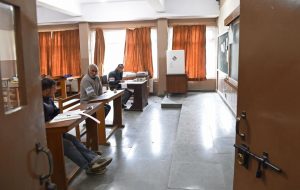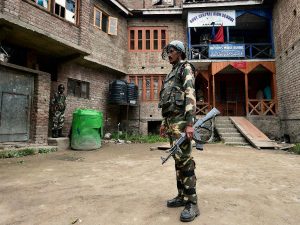Peace Watch » Editor's Take, Perspectives » Elections In J&K Never Meant bijli, sadak, and Pani
Elections In J&K Never Meant bijli, sadak, and Pani
2017 Elections Demolished Dominant Narrative
By
Z.G. Muhammad
Some sentences, ostensibly inconsequential make much bigger statements that even the author does not intend. Former Indian External Affair Minister in the NDA government, Jaswant Singh (5 December 1998 – 1 July 2002) in his book, ‘A Call to Honour- in Service of Emergent India’ has written about September 2002 Assembly election in Jammu and Kashmir, defeat of the ruling party and entry of new coalition in the corridors of power in the state. He sees the exercise that brought a new coalition in power in the state as “a very satisfying Foreign Office success.”
Some analysts in India regard the former Minister as the man responsible for ‘transforming India’s external policies and steering India’s foreign policy through most difficult times when after detonating nuclear bombs the United States had imposed economic sanctions on India. In such a bigger scenario, of India’s foreign policy why should conduct of an Assembly elections in Jammu and Kashmir, with a house of just seventy-five seats be a concern of his ministry and ‘seen by him as a “satisfying Foreign Office Success.”
The statement of Jaswant Singh debunks the much-trumpeted narrative that the elections in the state are concerned about local governance. These always had far greater significance than the bijli, sadak and pani discourse. The elections in the state right from those held for the “Constituent Assembly” in the fifties to those held at any other point of time during past sixty-five years have had a direct bearing on the Kashmir Dispute and international implications. That is why the United Nations Security Council promptly passed a resolution on 30 March 1951 against the instituting of the “Constituent Assembly” in the state that ‘would attempt to determine the future of shape and affiliation of the State. The resolution also categorically said that any action by this Assembly ‘ would not constitute a disposition of the state in accordance with the resolution adopted by the United Nations in 1948 and 1949.’ In 1956, after “Constituent Assembly” adopted the “State Constitution,” that in its preamble and also under Article 3 endorsed the accession of the state with India. The United Nations did not approve the action. It passed another resolution on January 24, 1957, delegitimizing the action by the State, and reaffirming that the disposition of the State would be made through a “fair and impartial plebiscite conducted under the auspices of the United Nations.” The then India’s envoy in UN and Jawaharlal Nehru is on record to have informed the United Nations that this action by the Jammu and Kashmir should not be seen as Government of India’s stand.
This election was followed by one after another sham election. No less than a close relation of Jawaharlal Nehru, and Governor of Jammu and Kashmir B. K. Nehru, in his autobiography, has denounced election held in Jammu and Kashmir as fraudulent. To quote him:
“From 1953 to 1975, Chief Ministers of State of J&K had been nominees of Delhi. Their appointment to that post was legitimized by holding of farcical and totally rigged elections in which the Congress party led by Delhi’s nominee was elected by huge majorities.”
A former police chief of Jammu and Kashmir, who was in thick of things for almost thirty-five years in his just published book has also confirmed what has B. K. Nehru and many others had said.
Morarji Desi, former Prime Minister of India in an interview with me in June 1984 claimed that 1977 elections ‘were the first fair elections in the state.’ When seen in right perspective, there were also played up as a verdict in support of Indira-Abdullah Agreement. Thus, supporting New Delhi’s ‘dominant discourse’ that the political battle in the state is not over the ‘reality of the accession but the quantum of autonomy.’
There was context to former External Affairs Minister’s jubilation over the conduct of Jammu and Kashmir elections in 2002. Immediately after September 11, World Trade Centre attack the US Secretary of State Colin Powell in mid-October 2001 visited the Sub-Continent. In Pakistan, he stated that the Kashmir issue was `central’ to Indo-Pakistan relations and it could be resolved if all parties engage with a willingness to address concerns in a mutually acceptable way. He also said he will carry the message to New Delhi that the beginning of a dialogue between India and Pakistan was the “most important thing that is needed now.’
Jaswant Singh in his book writes about New Delhi’s conveying its annoyance to Powell about his statement in Islamabad. Nevertheless, he very subtly admits about Powell insisting on the resolution of Kashmir problem. Subsequently, Colin Powell visited the region a couple of times. In July 2002, he once again visited the Sub-Continent for deescalating the tension caused between the two countries by the 13 December 2001 attack on the Parliament. It was during this visit that he saw a ‘fair election in the state as the first step in a broader process that begins to address Kashmiri grievances and leads India and Pakistan back to dialogue.’ Moreover he also asserted that the “only a productive and sustained bilateral dialogue on all issues, including Kashmir, will prevent future crises and will finally bring peace to the region.’ He urged Prime Minister Atal Behari Vajpayee and other top leaders to ensure that the Kashmir poll is judged “to be credible of Kashmiris and the outside world.” He also called for the release of the political prisoners and conducting of the elections in the presence of international observers. The suggestion did not go well with New Delhi. It did not agree to the proposal. Nevertheless, it looked at Pollen Colin’s proposition as an opportunity for strengthening its old discourse that Kashmiris have exercised their right to decide their future through the ballot- more than once.
New Delhi adopted a multipronged strategy for projecting the 2002 elections truly democratic and for a high voter out and ensured appeal of the resistance leadership for boycotting this election not having the same sway as it during the 1996 elections. The 1996 elections were not recognized only as a sham election internationally but also as a “military exercise.” In 1996 elections also, the US, Ambassador Frank Wisner was a central figure, who visited Kashmir more than once to ask the resistance leadership to partake in the elections. The six years Central Rule in the State had become a diplomatic liability for New Delhi, and it was eager to hold polls in the State. To give them some semblance of credibility by sucking in some resistance leadership into the electoral process. By offering some political bait, it had succeeded in winning over some incarcerated young leaders- but failed to have hold the bait on the fishing tackle for long. The government agencies having succeeded in categorizing the resistance leadership as “the moderates” and “the hardliners” were able to play this card during this 2002 elections and causing division amongst leaders over boycotting of the 2002 elections. The agencies did not stop there only but were also able to reach out to some religiopolitical organizations and a section of militants more particularly in the South Kashmir. The voter turnout in this election did give a diplomatic mileage to New Delhi in Washington. That was the reason for Jaswant Singh to see October 2002 elections “satisfying Foreign Office Success.
These elections caused three ripple effects. One, it gave a diplomatic mileage to New Delhi, in informing the world that a “credible election” was held in the state- it used the “change of guard” as a testimony. Two, these elections, with bijli, sadak, and Pani narrative stiffened sinews of electoral politics in the state. And three, these elections caused arranging a pair of sterile meetings between a section of the ‘resistance’ leadership and Prime Minister Vajpayee and Manmohan Singh and other ministers in the NDA and UPA government–of course these meetings were held without an agenda.
The narrative woven over the 2002 elections in the state for fifteen years about was demolished in April 2017 by-poll election with 7. 14 percent only casting their votes. Moreover, the repolling on 38 elections under the highest ever “security arrangement” with two percent casting their votes put a seal on this narrative.
Abridged version published in the Greater Kashmir on 17-04-2017
Filed under: Editor's Take, Perspectives · Tags: B.K. Nehru, Call of Honour, Collin Powell, Election in J&K. Kashmir Frauland Electios, Jaswant Singh, Kashmir, Z. G. muhammad








